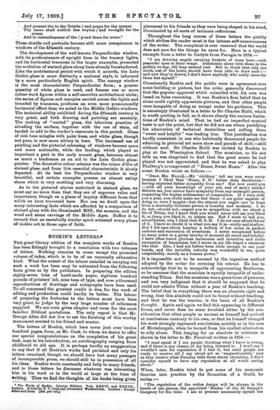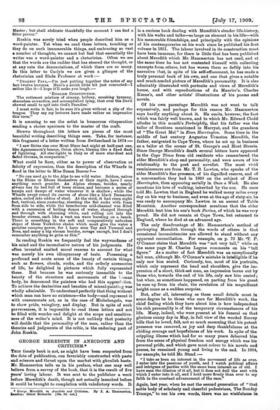RUSKIN'S LETTERS.* THE great library edition of the complete works
of Ruskin has been fittingly brought to a conclusion with two volumes of letters. Nothing remains to come except the promised volume of index, which is to be of an unusually exhaustive kind. What the extent of the labour entailed in carrying out such a work has been may be estimated from the following facts given us by the publishers. In preparing the edition eighty-seven tons of hand-made paper, eighteen hundred pounds of printers' ink, nine tons of type, and over a thousand reproductions of drawings and autographs have been used. To all concerned the greatest credit is due, for the work of editing and production could hardly be better. The labour of preparing the footnotes to the letters must have been very great, to judge by the very large number of references supplied. We are even given chapter and verse for the most familiar Biblical quotations. The only regret is that Mr. George Allen did not live to see the finishing of this worthy monument erected to his friend and master.
The letters of Ruskin, which here cover just over twelve hundred pages, form, as Mr. Cook, to whom we desire to offer our special congratulations on the completion of his great task, says in his introduction, an autobiography ranging from childhood to old age. It is perhaps hardly an exaggeration to say that if all Ruskin's works had perished and only his letters remained, though we should have lost many passages of incomparable prose, we should still be in possession of all his ideas. Ruskiu wrote constantly and fully to many friends, and in these letters he discusses whatever was interesting him in his Work or in the world at large at the time of writing. Thus we find the thoughts of his books being given • The Works of Ruskin. Library Edition. Vols. %XXVI. and xxxvrt., Letters. E litedby E. T. Cook and. Aleiutnder Weelderburn. London ; George Allen and Sons. NO. per vol.] '
piecemeal to his friends as they were being shaped in his mind, illuminated by all sorts of intimate reflections. .
Throughout the long course of these letters the quality which strikes the reader most is the intense self-consciousness of the writer. The complaint is ever renewed that the world does not care for the things he cares for. Here is a typical
example from a letter to Carlyle from Perugia in 1874;- "I am drawing angels carrying buckets of roses here—with peacocks' eyes in their wings. Absolutely alone with them in the gallery to-day, till they seemed real. But to think that only one monk, out of the hosts, should have been able to draw such !— and now they're drawn, I don't know anybody who really cares for them but myself."
Occasionally Ruskin and the public were in agreement over some building or picture, but the critic generally discovered that the popular approval which coincided with his own was based on false reasoning. It was Ruskin's firm belief that he alone could rightly appreciate pictures, and that other people were incapable of doing so except under his guidance. This is amusingly illustrated in a letter to Sir Charles Halle, which is worth quoting in full, as it shows clearly the curious limita- tions of Ruskin's mind. That he had an imperfect musical taste is not the point, but that he did not see where justifying his admiration of technical dexterities and calling them " sweet and helpful" was leading him. This justification was hardly consistent in one who habitually denounced people for admiring in pictorial art mere show and parade of skill,—skill without soul. Sir Charles Halle was invited by Ruskin to play at the Winnington School. The musician, so his son tells us, was chagrined to find that the good music he had played was not appreciated, and that he was asked to play Thalberg's arrangement of "Home, Sweet Home." After the event Ruskin wrote as follows :—
"Dsea Ma. Hann,—My ' children ' tell me you were sorry because I liked that 'Home, S. H.' better than Beethoven— having expected better sympathy from me ? But how could you —with all your knowledge of your art, and of men's minds? Believe me, you cannot have sympathy from any untaught person, respecting the higher noblenesses of composition. If I were with you a year, you could make me feel them—I am quite capable of doing so, were I taught—but the utmost you ought ever to hope from a musically-illiterate person is honesty and modesty. I do do not—should not—expect you to sympathise with me about a bit of Titian, but I know that you would never tell me you liked it, or fancy you liked it, to please me. But I want to tell you, nevertheless, why I liked that H. S. H. I do not care about the air of it. I have no doubt it is what you say it is—sickly and shallow. But I did care about hearing a million of low notes in perfect cadence and succession of sweetness. I never recognised before so many notes in a given brevity of moment all sweet and helpful. I have often heard glorious harmonies and inventive and noble succession of harmonies, but I never in my life heard a variation like that. Also, I had not before been close enough to see your hands, and the invisible velocity was wonderful to me, quite unspeakably, merely as a human power."
It is impossible not to be amused by the ingenious method adopted by the writer for covering his retreat. He has to acknowledge that he is incapable of appreciating Beethoven, so he assumes that the musician is equally incapable of under-
standing Titian. But the musician was a great lover of pictures, and was very indignant that it should be supposed that he could not admire Titian without a year of Ruskin's teaching. The belief that in everything there was an absolute right and wrong, that this absolute could not be found without teaching, and that he was the teacher, is the basis of all Ruskin's thought. Again and again we find this appearing in different forms, and never does he seem troubled either by the con- sideration that other people as earnest as himself had arrived at conclusions contrary to his own, or that he himself changed his most strongly expressed convictions, notably so in the case of Michelangelo, when he turned from his exalted admiration to silly abuse. This longing for an absolute in criticism is shown in the letter to Mr. Furnivall written in 1854 :-
"I must speak if I see people thinking what I know is wrong, and if there is any chance of my being listened to. I don't say I wouldn't care for reputation if I had it, but until people are ready to receive all I say about art as unquestionable,' just as they receive what Faraday tells them about chemistry, I don't consider myself to have any reputation at all worth caring about."
When, later, Ruskin tried to put some of his economic theories into practice by the formation of a Guild, he writes ;— "The regulation of the entire design will be always in the hands of one person, the appointed 'Master' of the St. George's Company for the time. I am at present necessarily myself the
Master ; but shall abdicate thankfully the moment I can find a fitter person."
Ruskin was sorely tried when people described him as a word-painter. Yet when we read these letters, touching as they do on such innumerable things, and embracing so vast a number of thoughts, we cannot but feel that essentially the
writer was a word-painter and a rhetorician. Often we see that the words are the rudder that has steered the thought, or
at any rate the denunciations, of which there are so many. In this letter to Carlyle we are given a glimpse of the rhetorician and Slade Professor at work :— "DEAREST PAPA,—I'm just putting together the notes of my last twelve lectures. Here's a nicish little bit just concocted—I rather like it—I hope it'll make you laugh
ENGLISH CONSTITUTION.
The rottenest mixture of simony, bribery, sneaking tyranny, shameless cowardice, and accomplished lying, that ever the Devil chewed small to spit into God's Paradise.'
I must write it fair, to be sure it's given without a slip of the tongue. They say my lectures have made rather an impression this term."
It is amusing to see the artist in humorous vituperation sending a choice specimen to the master of the craft.
Strewn throughout the letters are pieces of the most beautiful writing describing things seen. Take, for instance, this fragment of a letter written from Switzerland in 1874 :—
"I saw Sirius rise over Mont Blanc last night at half-past one, like Agamemnon's beacon, Orion above, blazing like a fixed flash of lightning. All star-lights in Italy as of mere star-dust and faded thrones, in comparison."
What could be finer, either as to power of observation or felicity of expression, than the description of the Wharfe in flood in the letter to Miss Susan Beaver ?—
"No one need go to the Alps to see wild water. Seldom, unless in the Rhine or Rhone themselves at their rapids, have I seen anything much grander. An Alpine stream, besides, nearly always has its bed full of loose stones, and becomes a series of humps and dumps of water wherever it is shallow ; while the Wharfe swept round its curves of shore like a black Damascus sabre, coiled into eddies of steel. At the strid, it had risen eight feet, vertical, since yesterday, sheeting the fiat rocks with foam from side to side, while the treacherous mid-channel was filled with a succession of boiling domes of water, charged through and through with churning white, and rolling out into the broader stream, each like a vast sea wave bursting on a beach. There is something in the soft and comparatively unbroken slopes of these Yorkshire shales which must give the water a peculiar sweeping power, for I have seen Tay and Tummel and Ness, and many a big stream besides, savage enough, but I don't remember anything so grim as this."
In reading Ruskin we frequently feel the waywardness of his mind and the inconclusive nature of his judgments. He often invented exalted moral reasons to account for what was merely his own idiosyncrasy of taste. Possessing a profound and acute sense of the beauty of certain things, such as flowers, clouds, rocks, and the orderly accessories of life, he delighted in pictures which fully represented these. But because he was curiously insensible to the beauty of the structure and movements of the 1 :man body, he denounced the painters who had this appreciation. To achieve the dexterities and beauties of missal-painting was wholly admirable. To understand perfectly that thing without which man can have no existence—the body—and represent it with consummate art, as in the case of Michelangelo, was to show pride, vainglory, and display. But in spite of such perverseness, it is impossible to read these letters and not be filled with wonder and delight at the scope and sensitive- ness of the writer's mind. It is not unlikely that posterity will decide that the personality of the man, rather than the theories and judgments of the critic, is the enduring part of John Ruskin.









































 Previous page
Previous page